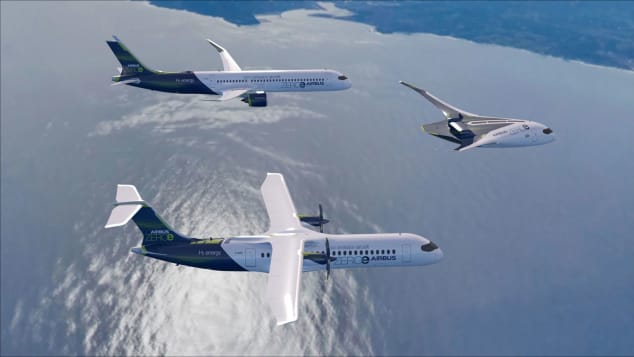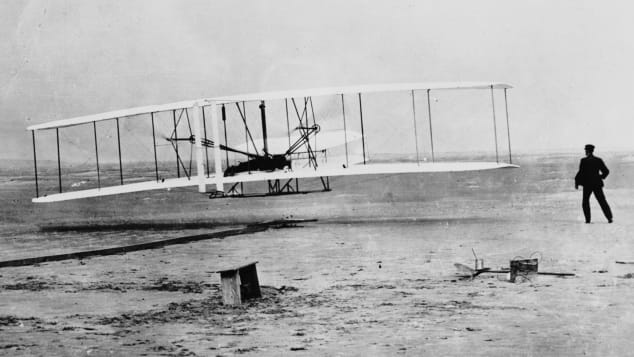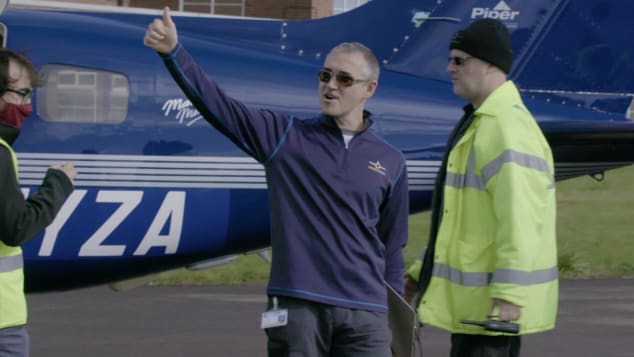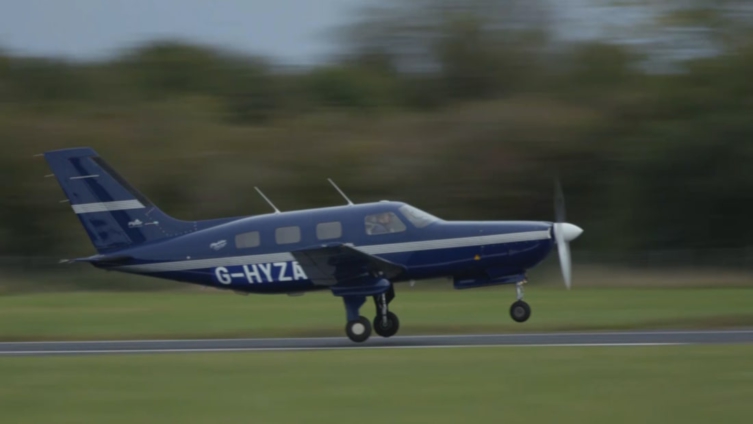Last month, a navy blue, six-seater aircraft took off at Cranfield Airport in England. Usually, a 15-minute, 20-mile flight wouldn't be noteworthy -- but this was the world's first hydrogen fuel-cell-powered flight for a commercial-size aircraft.
The plane's powertrain -- the mechanism which drives the plane, including fuel tanks and engine -- was built by ZeroAvia, a US and UK-based company developing hydrogen-electric engines.
Using liquid hydrogen to feed fuel cells, the technology eliminates carbon emissions during the flight.
A conventional flight today produces half the CO2 generated by flights in 1990, largely thanks to an increase in fuel efficiency.
However, due to record traffic growth, driven by increasing passenger numbers and trade volume, the aviation industry is creating more emissions than ever before -- accounting for 2% of global manmade carbon emissions.
This percentage is set to increase says Bobby Sethi, a senior lecturer in aviation at Cranfield University: other industries, like road transport, are "decarbonizing at a faster rate" he says, while aviation is lagging behind.
Some companies are pushing ahead with climate-friendly solutions in a bid to catch up. The Electric Aviation Group's 70-seat hybrid-electric aircraft aims to reduce CO2 emissions by 75% and is expected to enter service in 2028, while Airbus recently announced that it aims to manufacture three hydrogen aircraft, sitting up to 200 passengers, by 2035.

But there is a long wait until these models come to market and aviation needs a solution now, says ZeroAvia founder and CEO Val Miftakhov.
With funding from UK government-backed bodies including the Aerospace Technology Institute and Innovate UK, ZeroAvia wants to plug the gap as aviation technology develops, and provide a sustainable solution for short and medium haul flights.
Miftakhov, who piloted ZeroAvia's test flight, says the company's technology is designed to be retrofitted into existing aircraft.
He claims that ZeroAvia will have hydrogen-powered commercial planes taking to the sky in just three years.

An energy-dense fuel
While the spotlight has been on electric aviation for the past decade, the limitations of current battery technology restrict its expansion. Currently, lithium-ion batteries are around 48 times less energy-dense than kerosene, says Sethi.
This means scaling up is a problem for electric aviation. The largest electric plane flown to date is the 9-seater caravan. It has a range of only 100 miles -- for which it requires a battery weighing 2,000 pounds.
Sethi highlights that in larger planes, like a Boeing 747, the battery would far exceed the plane's maximum take-off weight.
"It's just not possible unless battery technology improves significantly, which is why hydrogen is a more viable option to fuel aircraft in the future," he says.
Having previously worked with electric car batteries, Miftakhov is well-versed in their pros and cons and that's why he opted for hydrogen.
Compared to even the "wildest predictions for battery technology," hydrogen -- which is three times more energy-dense than regular jet fuel -- has greater potential, he says.
Starting with short haul
While long haul flights generate more carbon emissions per flight, short-haul flights create more CO2 emissions per person, per kilometer.
That's why tackling short-haul flights is the first step in cutting aviation carbon emissions. In 2019, Norway announced a 2040 goal for emission-free domestic air travel, while both Austria and France bailed out their national carriers during the Covid-19 pandemic, with conditions to reduce the number of domestic flights.
ZeroAvia predicts that by 2023, it will have developed engines that can power 10 to 20-seat aircraft flying up to 500 miles -- the distance between London and Zurich, or Paris and Barcelona.
By 2026 they will be flying up to 80 passengers the same distance, says Miftakhov, enabling airlines to keep short-haul routes while limiting environmental damage.
The company hopes to expand to medium haul flights by 2030 -- flying over 100 passengers up to 1,000 miles, the distance between London and Rome.
New fuel, new infrastructure
ZeroAvia's ability to retrofit existing aircraft means it can get its hydrogen-electric technology in the air in a short time frame, says Miftakhov. Additionally, pilots won't have to retrain, as the controls and operations will be the same.
But switching to a new fuel will require new infrastructure.
At its base in Cranfield Airport, in collaboration with the European Marine Energy Centre (EMEC), ZeroAvia has created a model for a self-sufficient hydrogen airport. This includes an on-site, electrolysis-based hydrogen generator, hydrogen storage facilities, and refueling trucks.
The hydrogen used to fuel the test flight was made using 50% renewable energy, but ZeroAvia is working towards making its hydrogen production entirely renewable by the end of the year.
Miftakhov says he is starting with airlines and airports that are keen to install on-site hydrogen production.

ZeroAvia's next step is to carry out a longer test flight to showcase its powertrain's capacity, by flying the six-seater on a 250-mile journey from an airbase in Orkney.
As a pilot and avid traveller, who wants to "stop trashing our environment," developing a way to fly sustainably is both a personal and professional calling for Miftakhov. He hopes that ZeroAvia can take aviation from being a damaging industry to a "good thing again."
"There's something about the personal freedom that aviation gives you," says Miftakhov.
"Whether it's personal travel, reuniting with your family, or taking your kids to different places and having them experience different cultures, it's very important."
Latest Stories
-
Expansion Drive: Takoradi Technical University increases faculties
19 minutes -
SHS heads demand payment of outstanding funds before reopening of schools
55 minutes -
We thank God for the 2024 general elections – Akufo-Addo
1 hour -
Coconut Grove Beach Resort marks 30 years of excellence with memorable 9 lessons & carols service
1 hour -
WAFU B U-17 Girls’ Cup: Black Maidens beat Nigeria on penalties to win inaugral tournament
2 hours -
Real Madrid beat Sevilla to keep pressure on leaders Atletico
3 hours -
Liverpool put six past Spurs to go four points clear
3 hours -
Manchester United lose 3-0 at home to Bournemouth yet again
3 hours -
CHAN 2024Q: ‘It’s still an open game’ – Didi on Ghana’s draw with Nigeria
3 hours -
CHAN 2024Q: Ghana’s Black Galaxies held by Nigeria in first-leg tie
4 hours -
Dr Nduom hopeful defunct GN bank will be restored under Mahama administration
5 hours -
Bridget Bonnie celebrates NDC Victory, champions hope for women and youth
5 hours -
Shamima Muslim urges youth to lead Ghana’s renewal at 18Plus4NDC anniversary
6 hours -
Akufo-Addo condemns post-election violence, blames NDC
6 hours -
DAMC, Free Food Company, to distribute 10,000 packs of food to street kids
7 hours

